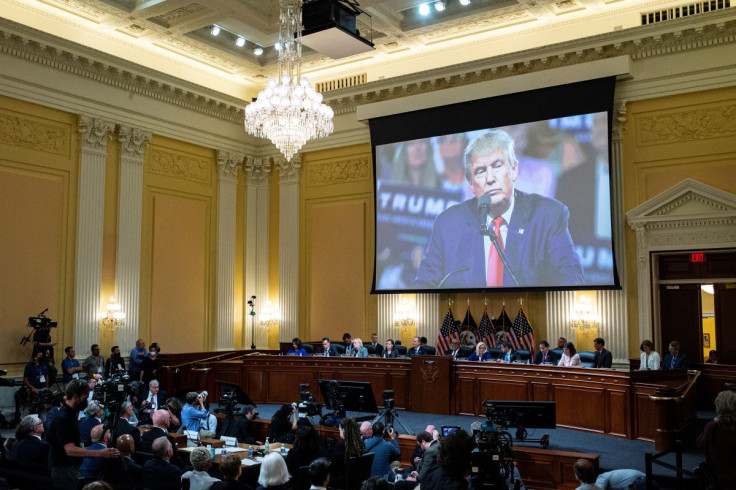Jan. 6 Capitol Riot Hearing To Focus On Trump Pressure On Justice Dept

Donald Trump's failed efforts to pressure Justice Department officials to overturn his 2020 election defeat will be the topic of Thursday's U.S. congressional hearing investigating his supporters' Jan. 6, 2021, attack on the U.S. Capitol.
The hearing, set to begin at 3 p.m. EDT (1900 GMT), will take the public into the White House on Jan. 3, 2021, when there was a discussion of then-President Trump possibly firing Acting Attorney General Jeffrey Rosen and replacing him with Jeffrey Clark, a fervent Trump supporter.
Rosen is scheduled to testify before the U.S. House of Representatives select committee along with Richard Donoghue, former acting deputy attorney general, and former Assistant Attorney General for the Office of Legal Counsel Steven Engel.
According to committee aides, Justice Department officials were also asked to take steps to encourage some states, such as Arizona and Georgia, to engineer Trump victories over Democrat Joe Biden even though Biden was the winner in those contests.
The Department of Justice on Wednesday delivered grand jury subpoenas to two Republican Party officials in Georgia, as well as to Trump campaign aides in Michigan, Arizona and New Mexico, the New York Times and Washington Post reported.
The department is investigating whether there was a plot to advance alternative slates of fake electors in battleground states with the goal of overturning the election result.
According to one subpoena seen by Reuters that is focused on the phony slate of electors in Georgia, investigators are seeking copies of documents from October 2020 related to "any effort, plan or attempt to serve as an elector in favor of Donald J. Trump and/or (Vice President) Mike R. Pence."
They also are seeking copies of communications between would-be electors and any federal government employees, as well as communications involving Trump allies, including lawyers Rudy Giuliani and John Eastman.
Thursday's congressional hearing, the fifth this month, will examine how Trump in the waning days of his presidency "was using the Department of Justice for his own personal needs" to stay in power beyond Jan. 20, 2021, a committee aide said.
In a fiery speech outside the White House that day, Trump spoke of a need to overturn his election defeat. His angry supporters stormed the Capitol, sending lawmakers and Pence fleeing for their lives.
Four people died on Jan. 6, one shot by police and the others of natural causes. Some 140 police officers were injured, and one who fought rioters died the next day. Four officers later died by suicide.
Nearly 850 people have been arrested for crimes related to the riot, including more than 250 charged with assaulting or impeding law enforcement.
Trump continues to falsely blame his defeat on widespread fraud, a claim rejected by courts, state election officials and members of his own administration.
Witnesses will testify, according to aides, that pressure was placed on Justice Department officials to publicly state that there was election fraud.
The hearing will highlight how a few senior Republican officials at the Justice Department resisted the Trump-led pressure campaign.
Testimony is expected to show that Clark had drafted a letter, never sent, to Georgia state lawmakers shortly after the 2020 election that falsely claimed the department had found concerns that may have influenced the election outcome there and elsewhere.
The letter urged state legislators to convene special sessions to overturn the election results, but Rosen and Donoghue refused to send it.
On Twitter earlier this year, Clark called himself "one of the top targets of the politically motivated J6 committee."
© Copyright Thomson Reuters {{Year}}. All rights reserved.





















